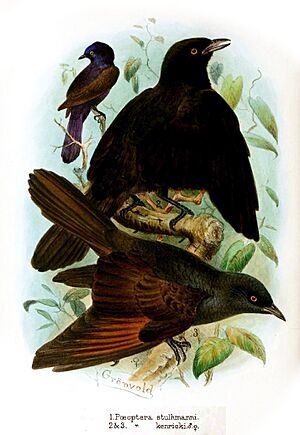Kenrick's starling facts for kids
Quick facts for kids Kenrick's starling |
|
|---|---|
 |
|
| A pair in the foreground with Stuhlmann's starling (topleft) | |
| Conservation status | |
| Scientific classification |
|
| Kingdom: | Animalia |
| Phylum: | Chordata |
| Class: | Aves |
| Order: | Passeriformes |
| Family: | Sturnidae |
| Genus: | Poeoptera |
| Species: |
P. kenricki
|
| Binomial name | |
| Poeoptera kenricki Shelley, 1894
|
|
| Script error: The function "autoWithCaption" does not exist. | |
Script error: No such module "Check for conflicting parameters".
The Kenrick's starling (Poeoptera kenricki) is a type of starling bird. It belongs to the Sturnidae family. You can find this bird in parts of Kenya and Tanzania.
Contents
About Kenrick's Starling
This bird was first described in 1894 by a person named George Ernest Shelley. He named it after Major Reginald Watkin Edward-Kenrick. Major Edward-Kenrick was an officer in the British Army who found the first bird in the Usambara Mountains in Tanzania.
The Kenrick's starling is now part of the Poeoptera group of birds. This name comes from the Greek language. Poeo means "to create" or "poet," and ptera means "wing." So, it's like a "poet bird."
There are two main types, or subspecies, of Kenrick's starling:
- P. k. kenricki - This type is found in the mountains of Tanzania.
- P. k. bensoni - This type lives near the eastern side of Mount Kenya.
What Does It Look Like?
Kenrick's starlings are medium-sized birds. Males usually weigh about 50 grams, and females weigh around 38 grams.
Male birds are a shiny black color. Females are a gray color. Females also have reddish-brown feathers on their wings. These are easiest to see when they are flying.
You can tell Kenrick's starling apart from Stuhlmann's starling mostly by where they live. The two birds are separated by the Rift Valley. Kenrick's starling also has yellow eyes, while Stuhlmann's starling has gray eyes. However, it can be hard to see the eye color in the wild.
The two subspecies look a little different too. The P. k. bensoni type is bigger. It also has a stronger beak. Its chest color changes more noticeably from top to bottom compared to P. k. kenricki.
Life and Habits
Kenrick's starlings like to build their nests inside holes. They often use old holes made by woodpeckers or barbets in trees. They prefer to nest in dead trees or dead branches.
Not much is known about how they raise their young. But we do know that both the mother and father bird help feed the baby chicks.
Where They Live
You can find Kenrick's starlings in Kenya and Tanzania. There was also a recent sighting of a large group of over 150 birds in Malawi.
In Kenya, they live around Mount Kenya. In Tanzania, they are found in the east and northeast. This includes the Usambara Mountains, Uluguru Mountains, Mount Kilimanjaro, and Mount Meru.
Images for kids
 | Shirley Ann Jackson |
 | Garett Morgan |
 | J. Ernest Wilkins Jr. |
 | Elijah McCoy |



